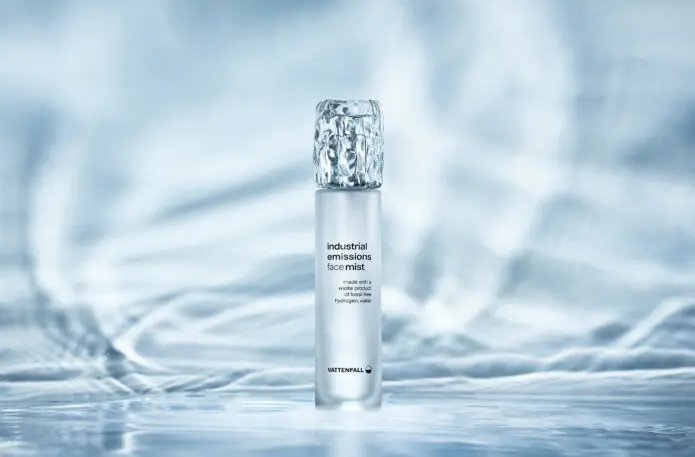For Cara Delevingne, who’s been the face of Chanel, Burberry, and YSL, beauty campaigns now come as second nature. At first glance, her newest campaign seems like a typical one. But the face mist she applies on herself isn’t so typical. It’s made from wastewater from an energy production facility.
That’s a byproduct of the green hydrogen produced by Vattenfall, a 114-year-old Swedish multinational energy company that is striving toward its goal of net-zero by 2040. The campaign aims to raise awareness for the cleanliness of hydrogen power versus burning fossil fuels, and features the already eco-conscious model and actress.
In the video spot, Delevingne strides through a set that mimics an energy plant, catwalking past huge tanks of “fossil-free hydrogen” as she’s sprayed with mist—before diving into a pool of wastewater. It feels like a tongue-in-cheek spoof of beauty campaigns, handling a serious subject with a playful tone. “I definitely felt like I had my Zoolander moment,” Delevingne says. “I really enjoyed that.”
“We wanted to challenge conventions about industrial waste,” says Paul Morel, Vattenfall’s brand campaign manager. The company wanted to raise awareness about clean energy, but with a positive message that demonstrates real solutions—in contrast to the usual “dull” and “dystopian” climate messaging. “Everything is so based on fear and scare tactics,” Delevingne says.
That positivity has been a thread through Vattenfall’s campaigns since 2018, when it announced its grand vision to attain “fossil-free living within one generation.” With its HYBRIT pilot project, it’s working to produce clean hydrogen to then use to produce fossil-free steel at its dedicated plant in Sweden—and to help decarbonize an industry that traditionally relies on burning coal.

Green hydrogen is primarily created through electrolysis, whereby electricity (from clean energy, like wind and hydro) splits water molecules into its component parts, hydrogen and oxygen. The tech is growing and has the potential to be used to decarbonize many other industries, including petrochemicals and aviation.
While fossil fuels produce carbon dioxide emissions, the main waste from hydrogen is water that’s clean enough to be further purified and repurposed. Like, into a face mist.
Swedish natural skincare brand Gerd made the mist, which is 88% water, plus other ingredients common in similar mists. To ensure the safety of applying wastewater products to human skin, Gerd ran all the necessary product testing as required by EU law.
To showcase the new product, Vattenfall recruited Delevingne, knowing she’s personally committed to climate awareness. In 2020, she started the nonprofit, EcoResolution, which aims to educate people to become more willing to act on climate in any way they can. “[This campaign] definitely felt different, because it felt like it had a purpose,” Delevingne says.
Vattenfall also tapped into Delevingne’s social media presence, not only to get through to more people on the issue—but also to attract potential investors and partners. She says that after some initial online sharing, people are finding the campaign funny, but are also asking some skeptical questions, which is “healthy” in the era of greenwashing. “A lot of people have taken advantage of this green movement, and do things that aren’t completely real,” she says.
The mist isn’t going on sale to the general public, rather is only available in limited edition, for press and via raffle for members of the public. “We’re an energy company,” Morel says. “We’re not going to venture into the beauty industry.”
Recognize your brand’s excellence by applying to this year’s Brands That Matter Awards before the early-rate deadline, May 3.
